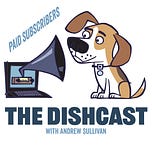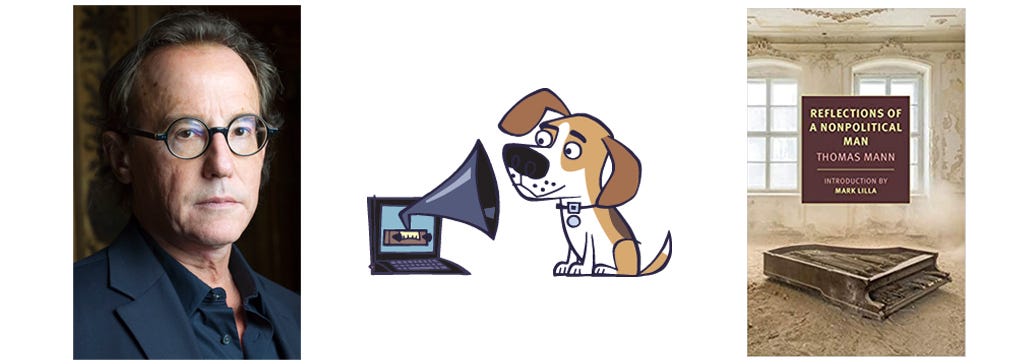Mark is a journalist, political scientist, historian of ideas, and a longtime friend since my twenties, when we studied political thought together. He has taught at NYU and the University of Chicago, and he’s currently a professor of humanities at Columbia. His many fine books include The Once and Future Liberal, The Reckless Mind, and The Shipwrecked Mind, and his forthcoming book is Ignorance and Bliss: On Wanting Not to Know. In this episode we focus on his essay, “On Indifference,” and the introduction he wrote for Thomas Mann’s Reflections of a Nonpolitical Man. It was a fantastic conversation.
You can listen to the episode right away in the audio player above (or on the right side of the player, click “Listen On” to add the Dishcast feed to your favorite podcast app — though Spotify sadly doesn’t accept the paid feed). For two clips of our convo — on whether political indifference is unjust, and the political consequences of the decline of novel reading — pop over to our YouTube page.
Other topics: Mark’s working-class upbringing in Detroit; “falling in with Jesus freaks” as a teenager; making it to Harvard; absorbing Thomas Mann and The Magic Mountain; Isaiah Berlin; the rivalry between Sartre and Aron; Orwell’s willingness to break ranks; The Lord Chandos Letter and walking away from writing; the moral hysteria after Trump’s election; Mark signing the Harper’s letter; the lack of perspective among young people who feel oppressed; how the most “privileged” are often the most depressed; rising levels of loneliness among teens; the dwindling of connections with extended family; the impact of the Internet and Covid on interacting with bodies; the importance of facial expressions; the need for silence and meditation; the problem of tourists using phones and drones; Johann Hari’s Stolen Focus; slowing the pace of capital for the sake of community; Rod Dreher’s The Benedict Option; the cultural impact of Vatican II; the reaction to wokeness in France and Italy; and my 2016 essay, “My Distraction Sickness and Yours.”
To get a sense of the conversation, the following passage on Montaigne’s “vision of private integrity and political hope” is from Sarah Bakewell’s biography of the French thinker:
Those who take Montaigne as a hero, or as a supportive companion, would argue that he did not advocate a “do-as-thou-wilt” approach to social duty. Instead, he thought that the solution to a world out of joint was for each person to get themselves back in joint: to learn “how to live,” beginning with the art of keeping your feet on the ground.
You can indeed find a message of inactivity, laziness, and disengagement in Montaigne, and probably also a justification for doing nothing when tyranny takes over, rather than resisting it. But many passages in the Essays seem rather to suggest that you should engage with the future; specifically, you should not turn your back on the real historical world in order to dream of paradise and religious transcendence. … As Flaubert told his friends, “Read Montaigne ... He will calm you.” But, as he also added: “Read him in order to live.”
Browse the Dishcast archive for another discussion you might enjoy (the first 102 episodes are free in their entirety — subscribe to get everything else). Coming up: Nigel Biggar on his qualified defense of colonialism, Tabia Lee on her firing as a DEI director, Chris Stirewalt on Fox News, Ben Smith on going viral, John Oberg on veganism, and Patrick Deneen on a post-liberal future. Send your guest recs and pod comments to dish@andrewsullivan.com.
Last week’s episode with Susan Neiman was a huge hit. One fan writes:
Greetings from you redneck friend deep in the People’s Republic of Travis County, Texas. Thank you so much for having Susan Neiman on your program. Her definition and analysis of woke was illuminating. I ordered a copy of Left is Not Woke immediately upon the conclusion of your conversation.
Here’s a clip of Susan:
Another listener dissents:
Sorry, but two things: First, the British Empire was not undone by the Enlightenment, but by two world wars that bankrupted it. Two, Carl Schmitt is hardly the only political theorist who sees raw power as the basis for all political action. In Germany, this tradition goes back at least to Max Weber, and variations of this theme can be found in a variety of thinks, such as Helmuth Plessner (an outspoken critic of Schmitt) and Karl Jaspers, who became a passionate defender of democracy after World War II.
This next listener focuses on the discomfort that Susan and I share over the term “ally”:
Although I agree to an extent with the criticisms of the term “ally,” my own objection has been that alliance is a transactional relationship, and being an “ally” in the woke sense, particularly when it comes to racial matters, offers no real benefit to the white individual. Regardless of what they assert or do, they will still be denounced as “white” and therefore a “racist” of lesser moral value. The same goes for the “cisgender” — that will still be used against you even if you speak up with vigour for whatever trans rights you’re supposed to.
The only time being an “ally” offers benefit is in the performative sense of attempting to curry favour and gain advantage. But even this is extremely tenuous. You often have to denounce yourself in order to protect what benefits you’ve gained.
A quick dissent:
Andrew, you may not be “at war” with trans people, etc., but a large part of the right in America does consider themselves at war. Just ask Ben Shapiro, Matt Walsh, or Ron DeSantis. Therefore the term “ally,” while limited for the reasons you say, still has its use.
Maybe — especially since the campaign has swiftly morphed into a denial that trans people exist. But the metaphor of war allows for no compromise, and democratic debates about the propriety of medical treatments for children happen all the time. In a highly contested area, we look likely to have a federal solution: with some states restricting, and others even expanding, sex changes for children. That’s called democracy, not war.
Next up, “a dedicated listener in Jerusalem (and sometimes in Stockholm and Seoul)”:
First, the episode hit me when Neiman described the political identity of Jews like her mom, identifying with the black struggle. I think the same is very much the case for why there were so many prominent Jewish neocons. The feeling is, Hitler did these awful things to us and nobody tried to stop it; therefore we have a duty to intervene on the side of people experiencing political oppression. I was 13 at the time of the Iraq War and remember feeling genuinely safer having heard that American tanks were rolling towards Baghdad, thinking that now there was an international norm that would make sure I’d never have to go through what my grandparents did — both Holocaust survivors.
Second, I do think Neiman misses something crucial about Netanyahu, or at least underestimates this factor — namely that the man does not seem to care about very much at all. Neiman almost seems to give him too much credit, talking about his beliefs as if though they formed a coherent, consistent ideology. He seems to me a fundamentally opportunist politician above all. That’s why he can both govern with Israel’s closest equivalent to actual ethno-fascists and conduct serious negotiations about support from an Arab Islamist party as a solution to the parliamentary deadlock prior to the Bennett-Lapid government. The man simply seems to care very little about anything outside his own political (and perhaps judicial) gain.
Thank you for an all-around fantastic episode. I can’t even count the books I’ve read — and learned so much from — after hearing about them on the Dishcast with your always interesting guests.
The latest guest rec:
I suggest you interview Rob Henderson, a young man who just graduated Cambridge with a PhD in psychology. He’s a gifted podcaster and amazing writer and you likely have heard of him. I think in ten years he may be the preeminent public intellectual in psychology, and his autobiography of rags in LA to riches in the UK is inspiring. He has enough similar political bent to you that you may get along famously.
Of course I know of Rob, and feel the same way about his work. Looking back to our episode with Bob Kaplan, a listener writes:
It was fantastic. I’m going to read his book on tragedy, since your conversation made it seem compelling. But I am not sure how tragic Truman was, in the sense of really facing what he was doing. On July 25, the day after the order went out to bomb four Japanese cities with A-bombs “as made ready,” Truman wrote in his diary that he had instructed the secretary of war to target soldiers and sailors and not women and children. But a lot more women and children died in Hiroshima than soldiers. Truman was either badly briefed or in denial or, more likely, both.
Another listener also “really enjoyed your interview with Kaplan”:
But one thing that bugged me about the discussion was how you both used the words “anarchy” and “chaos” interchangeably. I know that the tradition of conflating the two is at least as old as Hobbes, and it is true that anarchy often leads to chaos, but they are not, in my opinion, the same thing.
Anarchism has a bad rap — much of it deserved, but I share with Alan Jacobs the belief that there is much more to anarchism as a political philosophy than it is often given credit for. I would really love to hear you talk to an actual anarchist, or at the very least someone who is knowledgeable about the subject. It is too bad that David Graeber is no longer available (though he was, by all accounts, so prickly that it might have been impossible for the two of you to have a conversation), but what about his co-author for The Dawn of Everything, David Wengrow? Or James C. Scott?
I have often wondered if what we are all calling “wokeism” is in fact a misguided attempt at mainstreaming patterns of thought, speech, and being that originally belonged to anarchism — whether of the “dreadlocked white kid with a trust fund trying to start a squatter commune with his buddies” or the “hunter-gatherer in the Kalahari desert” variety. Forced consensus, speech codes, shaming, shunning, exile — these are all the tools that anarchical societies use to create order without hierarchy.
I used to be a member of such a group when I was a teenager and it was both exhausting and exhilarating. It wasn’t, ultimately, for me — I am too much of a non-conformist for anarchism — but I still understand the appeal. I would be interested to know whether you can see it, too.
Intriguing. I’ve honestly never read about a distinction between the two. Another listener continues the Dish debate over Taiwan:
With respect to your reader who charged you with being “blithe” about China swallowing Taiwan, so concerned with the instability that such a terrible situation would bring, he might ask himself: how “stable” is the world now when democracies are virtually totally reliant upon one superpower for their security? Should Americans be willing to get into a massive, bloody war and risk a nuclear exchange over Taiwan? If so, why? How about Ukraine? We’ve read that the entire global world order — democracy itself! — depends upon ensuring Russia is pushed out of every inch of Ukraine. That not only is nonsense, but it could only happen if NATO gets into a hot war with Russia and risks WWIII.
Concerns about losing influence and “what bad things could happen if we don’t control everything” are being swamped by the reality that we are losing by trying to do just that.
Being the near-sole superpower is ahistorical, unnatural and unsustainable. We need to demand the Euroblob get its shit together, that Arabs make mutual military pacts with each other, that Asian Pacific countries put their own plans and alliances together and then draw down our empire on our own terms. I know the idea of ending empire by choice is also ahistorical, but dear God, I hope it doesn’t take a catastrophic world war to end our empire, as it did Britain’s.
I feel you. Another reader looks to literature:
Any attempt to argue for protecting Taiwan framed in terms of interests — economics, nukes, credibility, etc — runs the risk of being outweighed by China simply escalating the potential costs inflicted on us beyond our capacity to bear. Therefore a case can be made in more poetic terms — one which I think will resonate with you in particular, given your British upbringing.
Consider JRR Tolkien’s Lord of the Rings. While Tolkien himself denied the characterization of the story as an allegory for WWII, it’s a popular misconception because it’s so evocative. And yet if you look at the world today, the place that most closely resembles The Shire is Taiwan:
Small, isolated territory? Check
Implacable threat looming just over the horizon? Check
Peaceable and unthreatening society? Check
Decent and hardworking folks who share our values? Check
This last point is crucial: after Filipinos, I’d rate Taiwanese as having the closest to American values of any Asian country. (As a Korean-American, I’m pretty sure Korean is a close third, losing points for being a little too conformist.)
Aragorn didn’t fight to protect the Shire because of a cost-benefit analysis. He did it because its people were as deserving of a future as they were incapable of ensuring it for themselves. It would be so easy to accept the loss of this small territory as an acceptable cost of a much larger conflict, but it would be a tragedy for civilization.
If the standard for foreign intervention was compatibility with another country’s population, where would it end?
Next up, many readers are dissenting over my views on the cultural impact of Dylan Mulvaney:
I am a college professor who could very well be canceled for the opinions I’m about to express, so please keep me anonymous. More importantly, my children could be negatively implicated. But I feel that the importance of this issue — for my children, and my students — requires that I try to contribute.
Listen to this episode with a 7-day free trial
Subscribe to The Weekly Dish to listen to this post and get 7 days of free access to the full post archives.













